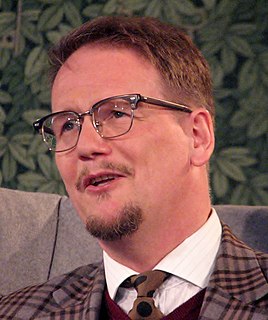A Quote by Sjon
I followed the launch of the library with Margaret Atwood and then David Mitchell. I just sat quietly at home secretly envying them. Then just over a month ago she asked me if I would like to be the third author to join the library.
Related Quotes
As a kid, I would get my parents to drop me off at my local library on their way to work during the summer holidays, and I would walk home at night. For several years, I read the children's library until I finished the children's library. Then I moved into the adult library and slowly worked my way through them.
As a kid I would get my parents to drop me off at my local library on their way to work during the summer holidays and I would walk home at night. For several years I read the children's library until I finished the children's library. Then I moved into the adult library and slowly worked my way through them.
My stepfather, John O'Hara, was the goodest man there was. He was not a man of many words, but of carefully chosen ones. He was the one parent who didn't try to fix me. One night I sat on his lap in his chair by the wood stove, sobbing. He just held me quietly and then asked only, "What does it feel like?" It was the first time I was prompted to articulate it. I thought about it, then said, "I feel homesick." That still feels like the most accurate description - I felt homesick, but I was home.
A friend of mine said to me a year ago, "You're so lucky, Nancy, because Ronnie left you the library," She said, "You have that to work on, and to go to, and, in a sense, to be with him." I had never thought of it like that, but it's true. I go to the library or work for the library all the time, because it's Ronnie. I'm working for Ronnie.
I am a librarian. I discovered me in the library. I went to find me in the library. Before I fell in love with libraries, I was just a six-year-old boy. The library fueled all of my curiosities, from dinosaurs to ancient Egypt. When I graduated from high school in 1938, I began going to the library three nights a week. I did this every week for almost ten years and finally, in 1947, around the time I got married, I figured I was done. So I graduated from the library when I was twenty-seven. I discovered that the library is the real school.
I was a voracious reader and the library fed my curiosity, imagination and my soul. I read by the shelf - biographies, fantasy - all and everything fed my dreams. Then as an adult whenever I would go on location the first thing we would do as a family is sign up at the closest library. Not only would we find books, but what was happening in that town, because the library is the head of the community.
The library smells like old books — a thousand leather doorways into other worlds. I hear silence, like the mind of God. I feel a presence in the empty chair beside me. The librarian watches me suspiciously. But the library is a sacred place, and I sit with the patron saint of readers. Pulsing goddess light moves through me for one moment like a glimpse of eternity instantly forgotten. She is gone. I smell mold, I hear the clock ticking, I see an empty chair. Ask me now and I'll say this is just a place where you can't play music or eat. She's gone. The library sucks.
I was a little tomboy, growing up, but we had to go to the library every weekend if we wanted some form of entertainment. And I would gravitate towards the Shirley Temple, Judy Garland section of the library, and I would just pop that in and watch on replay because kids can watch movies over and over again.
I always knew from that moment, from the time I found myself at home in that little segregated library in the South, all the way up until I walked up the steps of the New York City library, I always felt, in any town, if I can get to a library, I'll be okay. It really helped me as a child, and that never left me. So I have a special place for every library, in my heart of hearts.
Margaret Atwood, the Canadian novelist, once asked a group of women at a university why they felt threatened by men. The women said they were afraid of being beaten, raped, or killed by men. She then asked a group of men why they felt threatened by women. They said they were afraid women would laugh at them.
[D]on't ever apologize to an author for buying something in paperback, or taking it out from a library (that's what they're there for. Use your library). Don't apologize to this author for buying books second hand, or getting them from bookcrossing or borrowing a friend's copy. What's important to me is that people read the books and enjoy them, and that, at some point in there, the book was bought by someone. And that people who like things, tell other people. The most important thing is that people read.
At my first library job, I worked with a woman named Sheila Brownstein, who was The Reader's Advisor. She was a short, bosomy Englishwoman who accosted people at the shelves and asked if they wanted advice on what to read, and if the answer was yes, she asked what writers they already loved and then suggested somebody new.





































